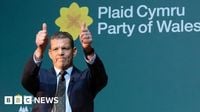In a move that could reshape the political landscape of Wales, Plaid Cymru leader Rhun ap Iorwerth has set his sights firmly on replacing Labour as the nation’s governing party, unveiling what he describes as the UK’s most generous childcare offer. The announcement, made during the party’s lively autumn conference at Swansea’s grand Brangwyn Hall on October 10, 2025, signals not only a major policy shift but also a strategic recalibration aimed at voters disillusioned with the status quo and wary of rising political alternatives.
“Labour’s time is up,” ap Iorwerth declared to a hall filled with supporters, as reported by BBC News. His message was clear: Plaid Cymru stands ready to lead Wales into a new era, one that prioritizes families, addresses the cost of living, and offers a progressive vision distinct from both Labour’s long-standing dominance and the disruptive ambitions of Reform UK.
At the heart of Plaid Cymru’s platform is a sweeping pledge: free universal childcare for all children aged nine months to four years. By the 2030/31 financial year, families would be entitled to at least 20 hours of free childcare per week for 48 weeks of the year, regardless of parental income or employment status. According to ITV News Wales, this policy would be a “game-changing intervention with a multi-generational impact,” potentially saving parents who currently receive no childcare assistance around £32,500 over the first four years of their child’s life.
“This can make a huge difference. It’s a very, very important step in terms of helping families with the cost of living. This is universal, which marks it out from the system in England,” ap Iorwerth told BBC Wales. Currently, the Welsh government’s childcare support is limited to families with parents in work, education, or training, or to very young children in specific areas. Plaid’s plan would extend help to all families, including those previously ineligible under current rules.
The rollout, as outlined by Plaid Cymru, would be phased over the next five years. The party promises to maintain the existing 30-hour offer for three- and four-year-olds, complete the 12.5-hour rollout for two-year-olds, and gradually extend 20 hours of free childcare to all children from nine months old. The policy’s cost is not insignificant: Plaid estimates an additional £500 million per year, bringing total annual childcare spending to £800 million. Ap Iorwerth insists that the funding can be found within the Welsh government’s existing budget, noting that about £400 million is expected to be available in the next budget cycle if other services increase only by inflation.
“It’s money that we know we can afford,” he asserted, according to BBC News. Still, when pressed by ITV News Wales, ap Iorwerth did not rule out the possibility of tax rises, emphasizing instead a desire for greater fiscal powers from Westminster so Wales could design its own tax system.
The bold childcare proposal is more than a policy—it’s a political strategy. Plaid Cymru is targeting not only its traditional base in north and west Wales but also voters in Labour strongholds like Swansea, where the party has historically struggled. The changing electoral landscape, with a larger Senedd and a new proportional voting system set for the 2026 election, has created an opening. Recent polling cited by ITV News Wales puts Plaid Cymru and Reform UK neck and neck at around 30%, with Labour trailing at 14%. Among younger voters, Plaid’s appeal is even stronger: a YouGov/ITV Wales survey found the party polling at 58% among 16–24 year olds and leading comfortably among the under-40s, while older voters are breaking for Reform UK.
Rhun ap Iorwerth’s message to these voters is direct. He called on those who have “never voted for Plaid Cymru before, the time is now.” He urged supporters to stop Reform UK and to “elect a government more radical, more ambitious, more impatient to bring about positive change.” He accused Nigel Farage and Reform UK of driving “the deliberate fragmentation of society,” warning that Reform’s policies would threaten the NHS with “US-style bills.” In contrast, Plaid has pledged an immediate cash injection into the NHS to prioritize the longest waits and vowed to keep the health service free at the point of need.
Yet, Plaid Cymru’s ambitions are tempered by political realities. No party is expected to win a majority in the May 2026 Senedd election, meaning Plaid may still need to cooperate with other parties to pass legislation. Ap Iorwerth acknowledged this, telling BBC News that other parties “would look at ways of influencing Plaid” if it became the largest party. However, he stopped short of saying Plaid would be open to coalition offers, hinting instead at a willingness to govern alone if it secures a significant minority of Members of the Senedd (MSs).
On Welsh independence, Plaid Cymru under ap Iorwerth has adopted a more pragmatic stance than in previous years. The party is not campaigning for an independence referendum in the next few years—a notable shift from its 2021 pledge. “There’s no referendum... in the next few years,” ap Iorwerth told Radio Wales Breakfast. However, he insists the party will “kick-start the national debate on independence” by establishing a permanent commission, building on the work of previous constitutional reviews. “It’s not just about aspiration, it’s about creating the best chance to build a modern nation of good health, opportunity, prosperity, and fairness,” he said in his conference speech.
Plaid’s universal childcare offer has attracted attention not only for its generosity but also for its potential impact on gender equality and child poverty. Sioned Williams MS, the party’s spokesperson on social justice and early years, highlighted the issue: “Current childcare costs in Wales are the highest anywhere in the UK with many families spending more on childcare than on housing. This locks many families out of accessing childcare at all. A Plaid Cymru government will go further and faster on extending access to childcare – to put money back in families’ pockets, combat child poverty, and provide the best start in life for every child in Wales.”
Of course, challenges remain. Nursery providers have expressed concerns about the sustainability of payments under higher costs, and questions linger about the feasibility of rapid expansion. Plaid says it has worked with stakeholders and is considering measures such as fast-tracking qualifications for childcare workers to address these issues.
The mood at Brangwyn Hall was described as busy and optimistic, with a sense among attendees that the business end of Welsh politics is fast approaching. As the Senedd election draws nearer, Plaid Cymru faces increased scrutiny—not just from political opponents, but from voters who will weigh the party’s ambitious promises against the practical realities of governance.
With the May 2026 election on the horizon, Plaid Cymru’s vision of a more generous, inclusive, and progressive Wales is now firmly in the spotlight. Whether that vision will be enough to break Labour’s century-long hold on Welsh politics remains to be seen, but one thing is certain: the contest for Wales’s future has never felt more open—or more consequential.


